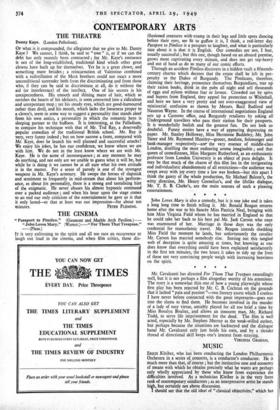THE CINEMA
" Passport to Pimlico." (Gaumont and Marble Arch Pavilion.) " John Loves Mary." (Warner.)—" For Them That Trespass." —(Plaza.)
IT is very enlivening to the spirit and all too rare an occurrence to laugh out loud in the cinema, and when film critics, those dis- illusioned creatures with cramp in their legs and little spots dancing before their eyes, see fit to guffaw it is, I think, a red-letter day. Passport to Pimlico is a passport to laughter, and what is particularly nice about it is that it is English. Our comedies are not, I fear, usually successful ; but this one, though based on an absurd premise, grows more captivating every minute, and does not get top-heavy and out of hand as do so many of our comic efforts.
Through an accident Pimlico discovers in a hidden vault a fifteenth- century charter which decrees that the estate shall be left in per- petuity to the Dukes of Burgundy. The Pimlicans, therefore, claiming their heritage, pronounce themselves Burgundians, tear up their ration books, drink in the pubs all night and sell thousands of eggs and nylons without fear or favour. Crowded out by spivs and buyers from England, they appeal for protection to Whitehall, and here we have a very pretty and not over-exaggerated view of ministerial confusion as shown by Messrs. Basil Radford and Naunton Wayne. In the course of international negotiations England sets up a Customs office, and Burgundy retaliates by asking all Underground travellers who pass their station for their passports. It is wonderfully foolish and the greatest fun. Do not look so doubtful. Funny stories have a way of appearing depressing on paper. Mr. Stanley Holloway, Miss Hermione Baddeley, Mr. John Slater and Mr. Raymond Huntley—grocer, modiste, fishmonger and bank-manager respectively—are the very essence of middle-class London, distilling the most endearing aroma imaginable ; and that queen of comediennes, Miss Margaret Rutherford, as an enthusiastic professor from London University is an object of pure delight. It may be that much of the charm of this film lies in the invigorating and individualistic abandonment of all restrictions—the audience was swept away with joy every time a law was broken—but this apart I think the gaiety of the whole production, Sir Michael Balcon's, the witty direction, Mr. Henry Cornelius's, and the lifelike dialogue, Mr. T. E. B. Clarke's, are the main sources of such a pleasing entertainment.
* * *
John Loves Mary is also a comedy, but it is one joke and it takes a long long time to finish telling it. Mr. Ronald Reagan returns home after the war to his fiancée Miss Patricia Neal, bringing with him Miss Virginia Field whom he has married in England so that he could take her back to his best pal Mr. Jack Carson who once was enamoured of her. Marriage in those days was the only credential for transatlantic travel. Mr. Reagan intends shedding Miss Field the moment he lands, but unfortunately the cavalier Mr. Carson has married somebody else. Sorting out this tangled web of deception is quite amusing at times, but knowing as one does know that everything could have been explained satisfactorily in the first ten minutes, the two hours it takes to tidy up the lives of these not very convincing people weigh with increasing heaviness on the spirit.
* * * *
Mr. Cavalcanti has directed For Them That Trespass exceedingly well, but it is not perhaps a film altogether worthy of his attentions. The story is a somewhat thin one of how a young playwright whose first play has been rejected by Mr. C. B. Cochran on the grounds that it lacked " pain and passion "—two literary assets which I confess I have never before connected with the great impresario—goes out into the slums to find them. He becomes involved in the murder of a lady of easy virtue, amiably played for all too brief a time by Miss Rosalyn Boulter, and allows an innocent man, Mr. Richard Todd, to serve life imprisonment for the deed. The film is well acted, especially by Mr. Stephen Murray as the weak-willed author, but perhaps because the situations are hackneyed and the dialogue banal Mr. Cavalcanti only just holds his own, and by a slender thread of directional skill keeps one's interest from straying.
VIRGINIA GRAHAM.


































 Previous page
Previous page